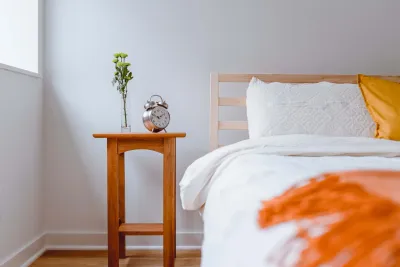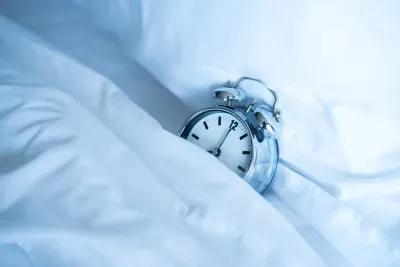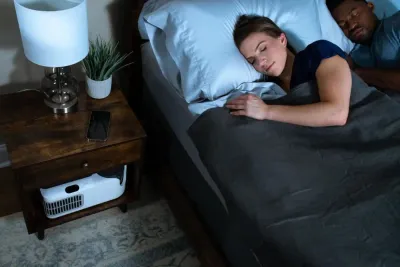
Key Takeaways
- Consistent Schedule: Going to bed and waking up at the same time helps regulate your internal clock.
- Calming Activities: Incorporating calming activities into your nighttime routine can help ease stress and gently prepare your mind for restful, uninterrupted sleep.
- Limit Screen Time: Reducing blue light exposure before bed promotes better sleep quality.
- Comfortable Environment: Creating a cool, dark, quiet room can enhance your sleep, along with a bed cooling system.
- Mindfulness Practices: Techniques like meditation and journaling can alleviate anxiety and improve sleep.
Sleep isn’t just something you fall into—it’s something you prepare for. Think of a bedtime routine like your body’s nightly operating system update: consistent, essential, and designed to optimize performance.
Without it, you're basically running on outdated software. Don't worry, we're here to help! Below, we’ll walk you through smart, science-backed ways to build a consistent bedtime routine that actually works and ensures you are getting enough sleep, so you can power down with purpose and wake up refreshed.
Optimize Your Sleep with Chilipad
Ready to take your bedtime routine to the next level? The Chilipad bed cooling system lets you fine-tune your sleep temperature for deeper, more restful sleep—all night long. Say goodbye to overheating and hello to personalized comfort. Your best sleep starts now!
Set a Consistent Sleep Schedule
Yes, a consistent sleep schedule is really important—weekends included. While it’s tempting to treat Saturday and Sunday like free-for-alls, regular sleep and wake time daily helps keep your internal clock running like a well-coded app.
Often overlooked, this simple and effective habit is pivotal in how easily you fall asleep and how energized you feel in the morning. Shoot for 7–9 hours of quality sleep each night to keep your system operating at peak performance.
Power Down to Recharge: Limit Screen Time
It’s all too easy to fall into the black hole of binge-watching or mindlessly scrolling through your phone—just one more episode, one more reel, and suddenly it’s 2 a.m. But here’s the deal: that blue light beaming from your screen?
It disrupts melatonin production, your body’s natural sleep hormone, making it harder to fall asleep and stay asleep. Limit screen time at least an hour before bed to stay on track. If you need a screen fix, switch on blue light filters or opt for sleep-friendly content like guided meditations.
Trust us, your future well-rested self will thank you by getting more sleep.
Engage in Calming Nighttime Activities
Sure, you've heard that meditation, stretching, or reading can help you sleep better, but maybe you’re not quite sure how to start. That’s totally fine.
The key is to try a few calming activities and see what fits your vibe.
- Meditation: Even a few minutes of mindfulness can help clear mental clutter and ease anxiety. No need to be a zen master—just start small.
- Gentle Stretching: Light bedtime yoga or simple stretches can release tension and focus to help your body it's time to chill.
- Reading: Pick up a physical book or magazine, something engaging but not intense, and let your mind ease into sleep mode.
- Controlled Breathing Methods: Quiet your mind and signal your body it's time to power down for the night.
You’ll thank yourself later. These low-effort habits work like your own personal sleep protocol, designed to bring calm, clarity, and deeper, more restful sleep.

Create a Relaxing Bedroom Environment
Your bedroom should feel less like a workspace and more like a sleep sanctuary. A well-designed bedroom environment can make all the difference between tossing and turning and sleeping like a champ.
Here are some helpful tips:
- Keep It Cool: A slightly lower room temperature supports deeper, uninterrupted sleep by helping to regulate your core body temperature. Aim for a temperature between 60-67 degrees Fahrenheit, as this range is known to induce sleep more effectively. Look into blackout curtains.
- Dim the Lights: Your lighting should follow suit as the sun goes down. Lower light levels in the evening help cue your brain that it’s time to wind down and recharge.
- Silence the Noise: Block out barking dogs, street traffic, or your neighbor’s midnight karaoke with white noise or listening to soothing sleepscape sounds.
Upgrade Your Bedtime Routine with Chilipad
As you build a bedtime routine that actually works, don’t overlook the power of temperature control. The Chilipad is a game-changing bed cooling system that lets you customize your bed’s temperature for the ultimate experience—cool, comfortable, and totally tailored to you.
By helping you maintain the ideal sleep temperature, Chilipad supports your body’s natural rhythms and sleep patterns, making it easier to fall asleep faster and stay asleep longer. No more tossing, turning, or overheating—just deep, uninterrupted rest.
Practice Mindfulness Techniques
Upgrade your nightly wind-down with mindfulness techniques designed to ease anxiety and optimize rest.
Here’s how to power down like a pro:
- Journaling: Offload those racing thoughts or tomorrow’s to-do list onto paper. Consider it a mental cache clear before bedtime. Offload lingering stress by doing a quick brain dump by grabbing a journal and jot it all down. Just a few minutes can clear your mental cache and make room for rest.
- Breathing Exercises: Give your nervous system a soft reset and reduce stress with deep breathing—try the 4-7-8 method for a built-in calm command that helps you power down and sleep easier.
Prep for Tomorrow Like a Pro
Give yourself a head start by spending 15–30 minutes each evening getting organized for the next day. Pick out your outfit (yes, even socks), pack up your bag, and take a quick look at your to-do list so there are no surprises in the morning.
Whether it’s pre-making lunch or queuing up your coffee, this mini nightly ritual reduces morning stress and sets the tone for a smooth, stress-free start.
Limit Caffeine and Alcohol Intake
Caffeine after 2 PM? That’s a no-go if you’re aiming to improve sleep quality. It lingers in your system and can throw off your sleep cycle. And while a nightcap might knock you out quicker, alcohol is known to disrupt your REM sleep later on for some people.
Establish a Pre-Sleep Ritual
Create a nightly wind-down ritual to signal it’s time to power down. Consider indulging in soothing playlists, enjoying a warm bath, or sipping on herbal tea before bedtime. By incorporating these activities regularly, you help your body recognize the signals to transition into rest mode seamlessly.
The great news is that the more you stick to your routine, the better your body understands the signals.
Don’t Sleep on Getting Support
If you're still struggling despite trying all the right moves, it might be time to call in backup. There’s zero shame in seeking help. Sleep issues are common, and a healthcare provider can help uncover what’s really going on.
A compassionate, professional approach can make all the difference—and honestly, needing help is never something to be embarrassed about.
Final Thought
Creating a bedtime routine that actually works isn’t about following a rigid checklist. It’s about building a system that works for you! From setting a consistent bedtime schedule to powering down your screens, engaging in calming rituals, handling your tasks and curating your bedroom environment, every step helps program your body and mind for better rest.
Imagine crafting your own nightly routine: consistent, dependable, and designed to enhance your performance. The best part? The more regularly you follow it, the more instinctive—and impactful—it becomes.
So whether you’re journaling your thoughts, dialing in the perfect bed temperature to cool your body with Chilipad, or simply prepping your outfit for tomorrow, you’re investing in a smoother night and a sharper tomorrow. Prioritize it, personalize it, and don’t hesitate to get expert support if you need a little extra help.
Now go ahead, shut it down, recharge, and wake up ready to run the day.









